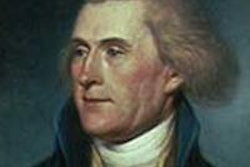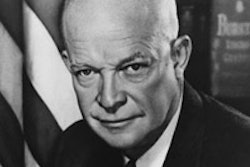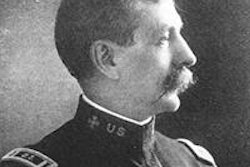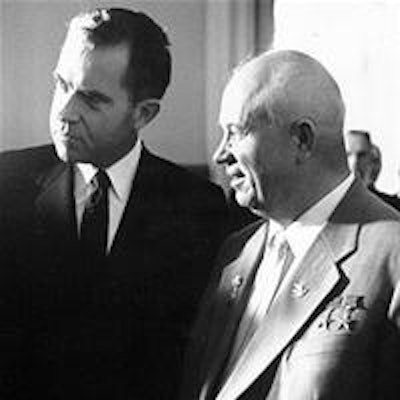
Like millions of Americans in the summer of 1959, Harriet Van Horne, a New York City newspaper columnist, saw the famous impromptu Moscow "Kitchen Debate" between Soviet Premier Nikita Khrushchev and U.S. Vice President Richard Nixon on the evening news.
The debate was essentially a shouting match during which the two vociferously touted their respective socioeconomic systems -- communism versus capitalism. The following day, Van Horne wrote, "Mr. Khrushchev needs dental repairs." She was referring to the gap between his two front teeth engulfed in a round face on which several large unflattering warts grew. The bald Khrushchev was 5 feet 1 inch tall and weighed 200 pounds. Peter Carlson, in his book K Blows Top, wrote the combination of the teeth, the wart, and the "huge pot belly made him look like a man shoplifting a watermelon."
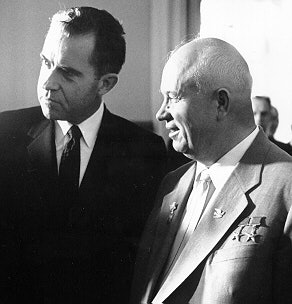 U.S. Vice President Richard Nixon and Soviet Premier Nikita Khrushchev in July 1959. Image courtesy of the U.S. National Archives and Records Administration.
U.S. Vice President Richard Nixon and Soviet Premier Nikita Khrushchev in July 1959. Image courtesy of the U.S. National Archives and Records Administration.
Two weeks before the Moscow debate, President Dwight D. Eisenhower had invited the portly Soviet dictator to visit the U.S. The invitation, which Khrushchev had quickly accepted, was a diplomatic accident. Eisenhower had instructed the U.S. ambassador to condition the invitation on an acceptable arrangement keeping Berlin an open-sectored city under joint U.S., British, French, and Soviet control.
Khrushchev had demanded U.S., British, and French military missions abandon the city which was wholly inside Communist East Germany. Ever since the end of World War II, Berlin had been a thorn in the Soviet Union's side, forcing them to grant access to the city to the Western powers' military and commercial interests.
Khrushchev was dumbfounded when he received Eisenhower's invitation. The U.S. ambassador (who personally delivered the written invitation) forgot to verbally add the codicil concerning Berlin. The wily Khrushchev, envisioning the potential diplomatic coup, immediately accepted.
Before this flurry of diplomatic activity, the ADA had quietly begun preparing to celebrate its centennial anniversary. The organization had grown from 26 members in 1859 to 125,000 in 1959. As part of its scheduling, the organization contracted for the use of several convention rooms and the grand ballroom of the Waldorf Astoria Hotel in New York City. The ADA had scheduled the ballroom for September 17, 1959, as the site for the ADA's House of Delegates official legislative session. Nearly 55,000 dentists from throughout the U.S., along with representatives from 64 foreign countries, were expected to converge on New York City to participate in the festivities. According to Carlson, the event would prove to be "the largest assemblage of dentists in history." Coincidentally, while in New York City, Khrushchev was being housed at the Waldorf Astoria, an international symbol of capitalistic opulence.
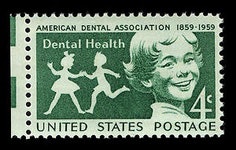 This stamp was issued in 1959 during the centennial meeting of the American Dental Association. Image courtesy of the National Postal Museum.
This stamp was issued in 1959 during the centennial meeting of the American Dental Association. Image courtesy of the National Postal Museum.
Khrushchev was crude and pugnacious, coupled with a mercurial temper. He seemed unstable and threatening, publicly telling the U.S. and its Western European allies at a reception in Poland "We will bury you." On another occasion while attending the general assembly of the United Nations in New York City, he became so enraged that he took off a shoe and pounded it on his delegate desk in protest.
On September 10, 1959, ADA President Percy T. Phillips, DDS, received two letters: one from the mayor of New York and the other from the U.S. Department of State's chief of protocol. Both letters advised Dr. Phillips that the ADA would have to give up the use of the ballroom in order for the mayor to safely host a luncheon for 1,200 businessmen "honoring" the visiting Khrushchev. The mayor referred to Khrushchev as his "distinguished guest," while the chief of protocol chimed in claiming "the national interest and great importance of ... the state visit" dictated the ADA must comply. Carlson sums up the ADA's reaction:
Like the fabled defenders of the Alamo, the American Dental Association drew a line in the sand and refused to budge. On September 11, [1959,] Percy Phillips fired back a letter that resounded like American history's classic statement of defiance -- "Give me liberty or give me death!" and "Damn the torpedoes, full speed ahead" -- although not quite so pithy.
The ADA, the mayor, and state department all refused to budge. The wily Phillips picked up his telephone and leaked the dilemma to the press. Newspaper headlines throughout country bellowed in support of the association -- an example, the Chicago Sun-Times headline: "Stubborn Dentists Won't Be Yanked."
The standoff between the U.S. government and ADA lasted three days. The adverse publicity forced the state department and mayor to relent. Nixon announced the good news in a speech before the convention: "The Russians got to the moon first, but the American Dental Association got to this ballroom first!" According to Carlson, "the dentists surged out of their seats, cheering their victory." The following day, headline writers had a field day: "String Pullers Can't Budge Teeth Pullers" and "Dentists Pull Teeth out of Khrush Fête."
The ADA in the meantime went about its business. The U.S. Post Office unveiled a commemorative postage stamp honoring the centennial, and E. R. Squibb and Sons introduced the first electric toothbrush known as the Broxodent, which awed the assemblage, giving the celebration yet another buzz.
After his tour of the U.S., Khrushchev returned to Moscow and continued his reign over the Soviet Union for another five years. In 1964, he was deposed due to "erratic behavior." He lived out his life in Moscow, where he died in 1971 at the age of 77.
Daniel Demers is a semiretired businessman whose hobby is researching and writing about 19th and 20th century historical events and personalities. He holds a bachelor's degree in history from George Washington University and a master's degree in business from Chapman University. You can review his other published works at www.danieldemers.com.
References
Books
Carlson P. K Blows Top: A Cold War Comic Interlude Starring Nikita Khrushchev, America's Most Unlikely Tourist. New York, NY: Public Affairs; 2009.
Khrushchev N. Khrushchev Remembers. Boston, MA: Little Brown and Company; 1970.
Kubijovyc V, ed. Ukraine: A Concise Encyclopedia. Toronto, Ontario: University of Toronto Press; 1963.
Journals/periodicals
Christiansen R, Kossen S. Unionists assail brutality of Nikita. San Francisco Examiner. September 22, 1959.
Dobriansky, LE. Crimes of Khrushchev against the Ukrainian people. Ukrainian Weekly. September 17, 1960. No. 179, Vol. LXVII. http://www.ukrweekly.com/old/archive/1960/1796003.shtml. Accessed November 4, 2013.
Harriman A. How Khrushchev stacks up against Stalin. San Francisco Examiner. September 6, 1959.
Websites
ADA history timeline. Archives of the American Dental Association. https://www.ada.org//sections/educationAndCareers/pdfs/ada_timeline.pdf. Accessed November 6, 2013.
American Dental Association website. https://www.ada.org/. Accessed October 30, 2013.
History of the toothbrush.Rusnak Family Dentistry and Orthodontics website. https://riverrundentalspa.com/history-toothbrush/. Accessed November 6, 2013.
Kitchen debate. Wikipedia website. https://en.wikipedia.org/wiki/Kitchen_Debate. Accessed October 30, 2013.
National Postal Museum. Pinterest website. https://www.pinterest.com/postalmuseum/working-in-america/. Accessed November 6, 2013.
Nikita Khrushchev. Wikipedia website. https://en.wikipedia.org/wiki/Nikita_Khrushchev. Accessed October 30, 2013.
Moore S. Who invented the electric toothbrush? eHow website. http://www.ehow.com/about_4598206_who-invented-electric-toothbrush.html. Accessed November 6, 2013.
Presidents of the American Dental Association. Archives of the American Dental Association. https://www.ada.org//sections/educationAndCareers/pdfs/presidents.pdf. Accessed November 6, 2013.
Shoe-banging Incident. Wikipedia website. https://en.wikipedia.org/wiki/Shoe-banging_incident. Accessed November 1, 2013.
Stalin's forced famine 1932-1933 -- 7,000,000 deaths. History Place website. https://www.historyplace.com/worldhistory/genocide/stalin.htm. Accessed November 4, 2013.
We Will Bury You. Wikipedia website. https://en.wikipedia.org/wiki/We_will_bury_you. Accessed October 31, 2013.
Email correspondence
Lydia Hall, manager, media relations, American Dental Association, November 8, 2013.




